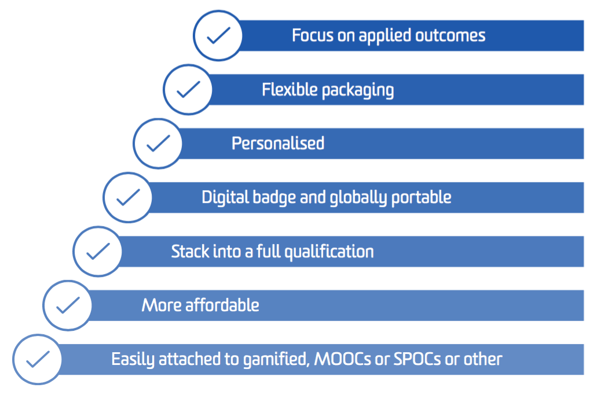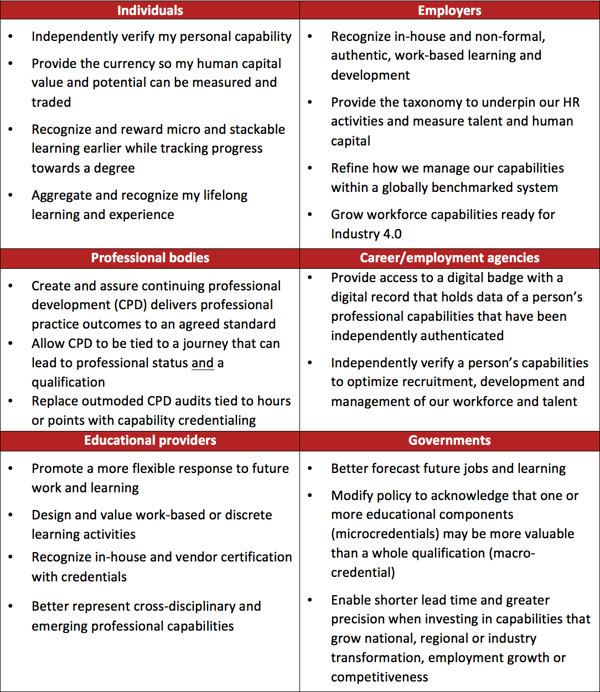Published on
Demystifying Credentials: Growing Capabilities for the Future

Few people realize the profound changes that a focus on professional capabilities and resulting microcredentials have made both to global education and the recognition of individual expertise.
Credentials based on professional capability standards are a solution to a problem many are still struggling to understand. Digital disruption and globalization has changed the landscape of work and learning forever. This disruption is changing what it means to acquire skills and knowledge. Tired models of doing business and structuring work have resulted in many businesses becoming non-competitive or fighting to survive in rapidly shrinking markets. To help existing businesses compete in the future and assist individual students and existing employees to gain work and sustainable career pathways, we need a viable, globally recognized credential system.
What credentials offer is a solution to the much hyped problems surrounding the ways in which disruptive changes will profoundly impact the employment landscape and world of work. Professional Practice Credentials offer an effective mechanism to improve educational offerings and employee engagement, build workforce capabilities and increase productivity and competitiveness in this turbulent environment.
Working with global alliance partners, we have researched, created and validated a new currency for professional credentials that employers and employees recognize, value and require to navigate the future world of work in the digital age.
What are credentials?
Credentials are a formal guarantee that skills and knowledge acquired through learning and experience have been successfully completed to agreed outcomes. Credentialing formally acknowledges the attainment of skills, knowledge and experience that can be applied to the professional standards of practice at a level of proficiency.
Current international focus has shifted the debate to a heavily nuanced but compelling view, away from a sole focus on macro-credentials, represented by qualifications, to a focus on microcredentials.

Key beneficiaries want credentials for a range of reasons. For instance:
Credentials and Professional Capability Standard
Credentials recognize capabilities. Capabilities are neither learning outcomes nor competencies. So what are they?
The development and deployment of professional capabilities reflects an enduring desire to assure viable futures for organizations, regions, industries and individuals by improving their capacity to be agile, flexible and responsive in macro-environments marked by digital disruption. It is about growing the capabilities of both individuals and workforces to ensure they can deliver competent performances and a cohesive culture while responding to future opportunities quickly. Essentially, capabilities are about outcomes and the ways in which the skills, knowledge and other attributes held by people within a company shape its ability to achieve its strategic purpose and remain competitive. As businesses raise their capability, they enhance competitiveness and responsiveness at regional, industry and national levels.
Credentials can confirm capabilities that are often hidden and undervalued. In doing this, credentialing releases the knowledge, skills and untapped potential inherent to the individual or workforce, allowing the human capital value to be more explicitly assessed and accurately determined. It does so using a capability taxonomy that can be applied across all locations, industries and businesses, irrespective of differences in culture or the ways in which job roles, skills or competency frameworks or technology systems are developed in these varying contexts.
So while a credential recognizes the attainment of a professional capability standard, it is also a tradeable form by which the underpinning currency—an individual’s independently verified professional capability—can be exchanged in the global labor market. Credentialing provides a consistent method to define and assess an individual’s current expertise and future potential in a form that an employer can understand and value.
Conclusion
Credentials today are no longer just about the result of learning. It may appear subtle, but the shift to an outcomes focus—away from learning as an input—is a significant development. Credentials independently verify and recognize personal expertise against standards reflecting requirements at specific levels of work in specific areas of professional practice. As such they emphasize authentic, contextual evidence of application and experience that demonstrate the standard expected in the area or practice. They now harness digital technologies and systems—machine learning, metadata, data analytics, digital badges—to ensure the assessment processes are not only authentic, flexible, reliable and valid, but also allow data being collected to be integrated in ways that inform priorities and provide richer evidence to improve customer or student experience.
Digital disruption and globalization has change the landscape of work and learning forever. Tired models of doing business and structuring work have resulted in many businesses becoming non-competitive or fighting to hold market share in rapidly shrinking markets. Credentials based on globally researched and validated professional capability standards can support businesses, regions and nations transition to new forms of work and learning.
Credentials empower organizations by measuring the existing capability and experience that lie within, giving them a framework for developing analytics and intelligence to drive vital decisions around human resources and talent management. Credentialing offers individuals an independent, personalized and globally portable way to communicate their current capability and potential. Governments can identify and target component parts of a qualification to nimbly respond to emerging demands for skills. Looking toward a future of profound shifts in the structure of both education and work, Professional Practice Credentials will be the transportable symbols of recognition and capabilities in action that individuals and businesses will use to navigate the future world of work in the digital age.
This article is an extract of the DeakinDigital white paper, ‘Demystifying Credentials: Growing capabilities for the future’, available here.
– – – –
Glossary:
Credential: Is a formal assurance and recognition by an authoritative, independent third party that has assessed and judged that a person, through experience and workplace performance, has achieved a particular professional capability standard.
Professional Capability Standard: Is the specification of the outcome confirming the ability of an individual (or group of individuals such as a team, workforce or organization) to apply and transfer their skills, knowledge and experience to a range of business or professional contexts.




